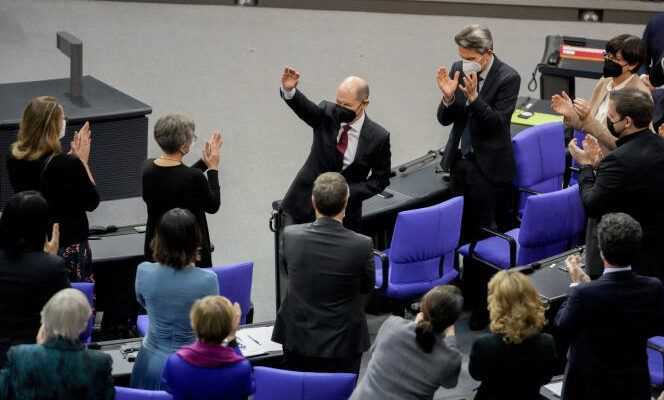Two and a half months after the elections in Germany, the Social Democrat Olaf Scholz was elected on Wednesday 8 December as chancellor by the Bundestag. At 63, and the head of an unprecedented coalition made up of the Social Democratic Party (SPD), the Greens and the Liberals of the FDP, he succeeds Angela Merkel.
Supported by the SPD, the Greens and the Liberals, it received the votes of 395 of the 736 members of the Bundestag. In the process, he was to go to the residence of the President of the Federal Republic, Frank-Walter Steinmeier to receive his “Act of appointment”.
There was no doubt about his election as the ninth chancellor of post-war Germany: his Social Democratic Party (SPD), which came first in the legislative elections, has a comfortable majority (206 seats), with its two new partners coalition, the Greens (118 seats) and the Liberals of the FDP (92). He needs 369 votes to be elected.
Angela Merkel, who has received numerous tributes in recent weeks, will leave the Chancellery for good after a handover ceremony with Olaf Scholz and put an end to thirty-one years of political career, sixteen of which have led the first European economy.
Meeting the challenge of Covid
A convinced feminist, Olaf Scholz will take over the reins of a government made up for the first time as many men as women. Three of them will be at the head of key ministries: foreign affairs for the ecologist Annalena Baerbock, defense and the interior for the two social democrats Christine Lambrecht and Nancy Faeser.
The government will also be unprecedented in its political composition. For the first time since the 1950s, it will bring together three parties: the SPD, the Greens and the Liberal Democratic Party (FDP). Despite electoral programs that are sometimes at odds, these three parties quickly reached agreement on a program that gives pride of place to climate protection, budgetary rigor and Europe. Christian Lindner, the leader of the liberals and paragon of budgetary austerity, must also take the head of the powerful finance ministry.
But one of the first challenges of the Scholz government will be to face the health crisis, while a new wave of contamination by the SARS-CoV-2 coronavirus has been undermining the hospital system for several weeks. Germany on Wednesday recorded the highest number of daily deaths from COVID-19 since last February, with 527 deaths, bringing the total of deaths to 104,047 since the start of the pandemic in 2020.
